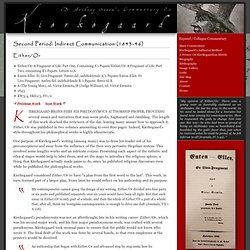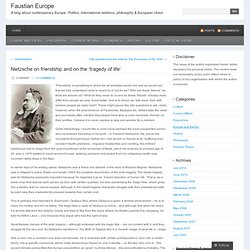

Kierkegaard. Introduction The Danish philosopher Soren Kiekegaard in his essay on ancient and modern tragic drama, which you read for today, puts forth his views on what distinguishes the modern concetion of tragedy from the ancient type.

In order to do so, he invokes the figure of Antigone from SophoclesÕ three Oedipus plays, and then invents his own modern Antigone, whom he contrasts with the Sophoclean heroine. His purpose in doing so is to explain what is tragic about each of these heroines, SophoclesÕ ancient and his own modern Antigone, and so to illustrate the difference (as he sees it) between ancient and modern conceptions of tragedy. In todayÕs lecture and in sections tomorrow and Friday we will discuss some of the strategies that Kierkegaard uses to develop his argument.
We will question some of his assumptions not so much to decide whether they are right or wrong as to bring out some of the habits of mind that lead him to formulate an argument like this. Ancient and Modern Authenticity. Kierkegaard, D. Anthony Storm's Commentary on - Either/Or. Either/Or: A Fragment of Life: Part One, Containing A's Papers/Either/Or: A Fragment of Life: Part Two, containing B's Papers, Letters to A Enten-Eller.

Et Livs-Fragment: Første del, indeholdende A.'s Papirer/Enten-Eller. Et Livs-Fragment: Anden del, indeholdende B.'s Papirer, Breve til B A (The Young Man), ed. Victor Eremita/B (Judge William), ed. Kierkegaard begins here his pseudonymous authorship proper, providing several essays and narratives that may seem prolix, haphazard and rambling. One purpose of Kierkegaard's writing (among many) was to draw his reader out of his preconceptions and away from the influence of the then very pervasive Hegelian system. Kierkegaard considered Either/Or to have "a plan from the first word to the last". My contemporaries cannot grasp the design of my writing. Kierkegaard's pseudonymity was not an afterthought late in his writing career. What I have understood as the task of the authorship has been done. Part One Diapsalmata Silhouettes The First Love. Outline of Aristotle's Theory of Tragedy.
Hegel on Tragedy. Hegel on Tragedy. Aristotle. Aristotle_Tragedy. Nietzsche on friendship and on the ‘tragedy of life’ « Faustian Europe. ‘Friendship’ is something to which we all probably would nod and we would say that we fully understand what is meant by it, but do we?

Who are these ‘friends’ we think are around us? What do they mean to us and do these ‘friends’ of today really differ from people we only ‘know better’ and or to whom we ‘talk more’ than with random people we daily meet? These might sound like silly questions to ask, really, however, when the phenomenon of Facebooks, Myspace etc. strikes daily the news and journalists often mention that people have tens or even hundreds ‘friends’ on their profiles, I believe it is never useless to stop and wonder for a moment. Quite interestingly, I would like to point out to perhaps the most unexpected person who considered friendship in his work – to Friedrich Nietzsche. He, just as the voluntarist Schopenhauer before him, had almost no friends at all. In earlier days of his writing career, Nietzsche was a friend and admirer of the work of Richard Wagner.
Like this: Tragedy. Amazon.co. Tragedy_after_Aristotle.